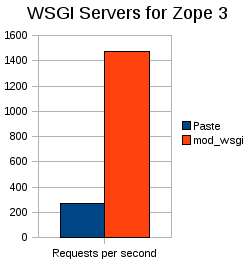At the Zope sprint held during PyCon 2009, we had a multi-day discussion about the Zope publisher. Some people were expecting a fight between Jim and me about the best way forward. So what happened? Read on!
Tag: WSGI
The Fastest WSGI Server for Zope
I have been planning to compare mod_wsgi with paste.httpserver, which Zope 3 uses by default. I guessed the improvement would be small since parsing HTTP isn’t exactly computationally intensive. Today I finally had a good chance to perform the test on a new linode virtual host.
The difference blew me away. I couldn’t believe it at first, so I double-checked everything. The results came out about the same every time, though:

I used the ab command to run this test, like so:
ab -n 1000 -c 8 http://localhost/
The requests are directed at a simple Zope page template with no dynamic content (yet), but the Zope publisher, security, and component architecture are all deeply involved. The Paste HTTP server handles up to 276 requests per second, while a simple configuration of mod_wsgi handles up to 1476 per second. Apparently, Graham‘s beautiful Apache module is over 5 times as fast for this workload. Amazing!
Well, admittedly, no… it’s not actually amazing. I ran this test on a Xen guest that has access to 4 cores. I configured mod_wsgi to run 4 processes, each with 1 thread. This mod_wsgi configuration has no lock contention. The Paste HTTP server lets you run multiple threads, but not multiple processes, leading to enormous contention for Python’s global interpreter lock. The Paste HTTP server is easier to get running, but it’s clearly not intended to compete with the likes of mod_wsgi for production use.
I confirmed this explanation by running “ab -n 1000 -c 1 http://localhost/”; in this case, both servers handled just under 400 requests per second. Clearly, running multiple processes is a much better idea than running multiple threads, and with mod_wsgi, running multiple processes is now easy. My instance of Zope 3 is running RelStorage 1.1.3 on MySQL. (This also confirms that the MySQL connector in RelStorage can poll the database at least 1476 times per second. That’s good to know, although even higher speeds should be attainable by enabling the memcached integration.)
I mostly followed the repoze.grok on mod_wsgi tutorial, except that I used zopeproject instead of Repoze or Grok. The key ingredient is the WSGI script that hits my Zope application to handle requests. Here is my WSGI script (sanitized):
# set up sys.path.
code = open('/opt/myapp/bin/myapp-ctl').read()
exec code
# load the app
from paste.deploy import loadapp
zope_app = loadapp('config:/opt/myapp/deploy.ini')
def application(environ, start_response):
# translate the path
path = environ['PATH_INFO']
host = environ['SERVER_NAME']
port = environ['SERVER_PORT']
scheme = environ['wsgi.url_scheme']
environ['PATH_INFO'] = (
'/myapp/++vh++%s:%s:%s/++%s' % (scheme, host, port, path))
# call Zope
return zope_app(environ, start_response)
This script is mostly trivial, except that it modifies the PATH_INFO variable to map the root URL to a folder inside Zope. I’m sure the same path translation is possible with Apache rewrite rules, but this way is easier, I think.
Limits of zope.pipeline
I’m starting to get a sense of what publisher functionality I can put in a WSGI pipeline and what I shouldn’t.
The pipeline is very useful for specifying the order things should happen. For example, the error handling should be as early in the pipeline as possible, so it can handle many kinds of errors, but it has to come after the pipeline element that opens and closes the root database connection. Constraints like that have never been expressed clearly in the current publisher.
I was planning to encapsulate the <base> tag mangling logic in a simple pipeline step, but I’ve studied how it currently works and I realize now that WSGI doesn’t provide a good abstraction for the kind of heuristics Zope uses to makes the <base> tag logic fast. I am considering several choices:
- Split the base tag handling between a pipeline element and a new adapter.
- Add short-lived output filter hooks to the response, similar to the traversal_hooks I added to requests, which I think turned out quite nice.
- Stick to the original plan, which might cause performance problems since Zope would then have to buffer potentially large output streams.
I need to choose the pattern that maximizes clarity for readers. #1 and #2 are very similar. #1 is less direct and thus more ambiguous than #2, but #1 is used more often in Zope code.